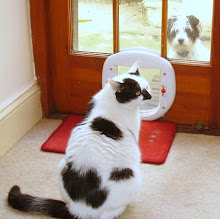Monday, 16 July 2007
Friday 13th
On Friday we had to take Mollie to the vet for her annual booster. As most of you will have gathered by now, she’s a good natured dog, excellent with children, adults and other dogs alike.
When she enters the vet she sits, alert and well behaved, trying to make friends with other dogs/cats/rabbits and their owners. (I took her to puppy class there so she evidently has happy memories.) But get her into the consulting room and face her with a bloke in a green coat and she goes beserk. Suddenly this loving, friendly dog becomes a whirlwind of frantic growls, teeth and flying claws.
Trying to put a muzzle on her made things worse, and while Himself held her and the vet finally gave her the jab, I don’t know who was more distressed; her or us. Given how most of us feel when we have to go to the dentist, you can sympathise to a certain degree. As this happened last time she came for her jab, I asked if a lot of dogs were like this, and was told ‘only a few’.
Well, that pulled me up with a start. I’d thought most dogs went bonkers at the vet’s, but evidently not. Despite having gone through Going To The Vet at puppy class, which she was fine with, faced with a real vet in a real consulting room, she panicked.
‘She doesn’t like vets because every time she comes up here, something horrible happens.’ Himself said. ‘Does she really need to go to the vet?’
‘Yes,’ I said, rather shortly. ‘What we have to do is get her to realise that vets are OK people, so she needn’t be afraid of them.’
Luckily our vet agreed with me and suggested that we bring her in out of surgery hours when it’s quiet so she can meet the vets, play with them and have a few treats and hopefully reverse her bad associations. It’s like having panic attacks – you have to relearn behavioural patterns.
This has yet to be put into practise, but I feel better knowing that the vets realise what the problem is, and are prepared to put the time in to rectify the problem. It also made me realise how thin the line is between a loving well behaved dog (or child/adult) and one that goes loopy for whatever reason.
Having worked with young offenders, I could see Mollie’s behaviour only too well in some of our Young Crims, as we called them. Fear is very often the reason behind such behaviour. If these fears can be caught before they are blown into full scale behavioural problems, the person/dog will be fine. If not – well, the rescue centres are full of ‘badly behaved’ dogs. Teenagers are given ASBOs or sent to Young Offenders’ Institutions. Adults are sent to prison.
I don’t intend to let that happen to Moll.
Subscribe to:
Post Comments (Atom)


















2 comments:
Poor Moll - it sounds like she's had a traumatic time.
While my (now deceased) family's dogs used to tense up when we took them to the vets, they weren't too bad, but I've seen some dogs being dragged into the consulting room, and heard some dogs whine and bark like crazy. It must be an awfully scary experience when you don't know what's going on or why.
A very good idea to try to get her used to the vets. I really hope that the plan succeeds.
RT
glad you approve, RT! I hope so too...
Post a Comment